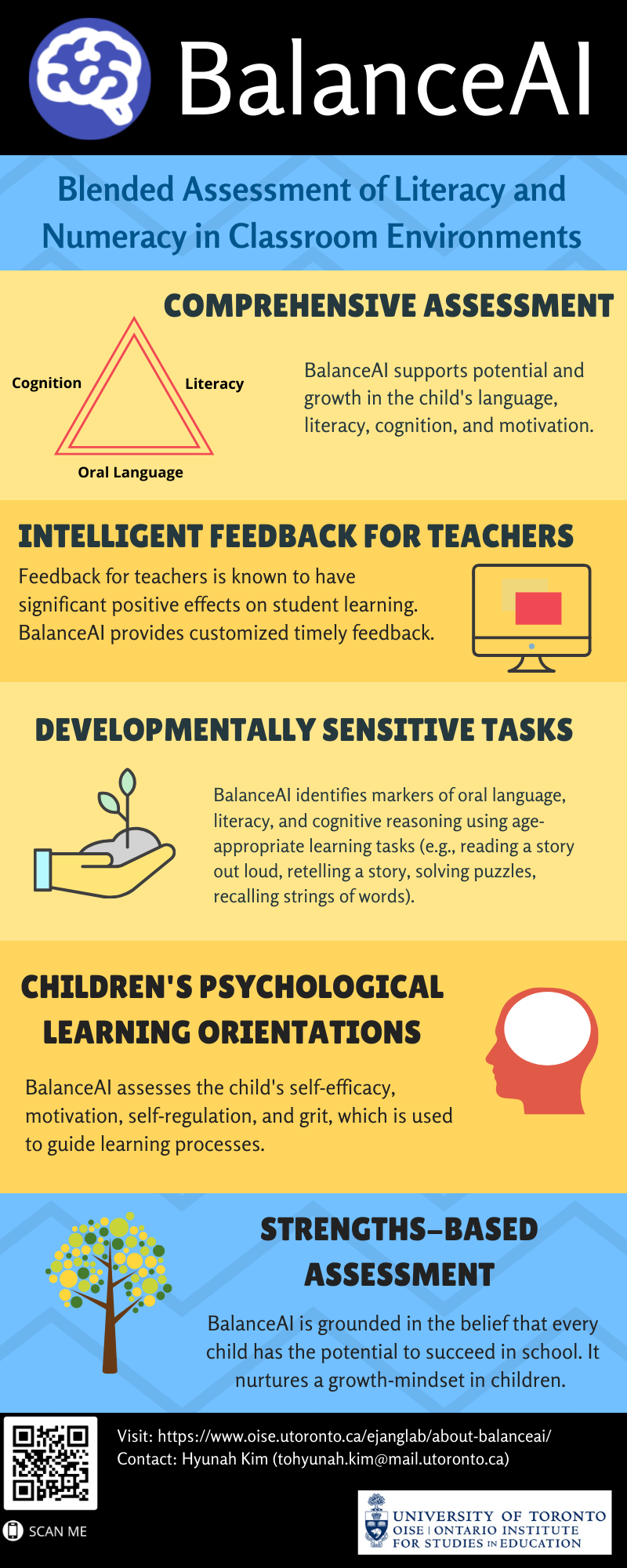Balance AI
Welcome to BalanceAI!
We are a group of researchers from the Innovative Development in Educational Language Assessment (IDELA) Lab at the University of Toronto.
The current large-scale literacy assessments in place in Ontario schools, which are based on a static rather than dynamic model of learning, only provide a fraction of information about what students know and can do. There is a critical need for 21st century assessment models that can gather data on broader areas of student learning, including students’ ability to take up and synthesize new information, their abilities to “think about thinking” (metacognition), their engagement with the subject matter, their ability to communicate competently in an online interface, and their capacity for self-regulation. BalanceAI will assess the literacy skills that are foundational in Ontario schools today and provide scaffolded intervention in areas of metacognition and self-regulated learning skills to support students’ literacy development.
BalanceAI, a digital language and literacy assessment tool, for students and their teachers was developed based on a federal research grant in 2017. Over 200 students across three TDSB schools participated in the first field study (Thank you all!). Based on input from our students and teachers, we identified linguistic and cognitive markers that can be used to distinguish among students with different proficiency levels. We also improved its tasks and added new ones to BalanceAI.
Our project is expected to contribute to significant improvement in student learning outcomes as measured by provincial achievement assessments and standardized cognitive measures. Individual students will be provided with comprehensive profiles that can be shared and tracked over time, and differentiated instruction can be tailored to their needs. This can lead to significant reduction in the costs for purchasing commercial measures and training teachers for implementation. Equally importantly, it will contribute to improved student engagement with positive experiences with assessment, while strengthening students’ self-regulation
Currently, we are recruiting students and teachers in TDSB schools who are interested in using BalanceAI in their classrooms.
Procedures - What happens during the study?
Step 1: Informed consent
We need consents from teachers, parents, and students! Once all consent to participate in the study, individual students can create a user account in the BalanceAI website. In order to sign up, students are asked to answer a few questions about grade, language background, and learning needs. All data collected here will be kept anonymous, meaning personal information will not be disclosed.
Step 2: Group administration of BALLI and BALA
Teachers administer BALLI to understand their students’ orientations to learning, self-efficacy, self-regulated learning, and resilience. BalanceAI provides immediate reports about individual students, which teachers can use to make instructional decisions on how to better support them. BALA includes several reading and writing tasks. It encourages students to reason critically by asking them to generate their own questions and reflect on their interest levels. Teachers can use the BALA subtasks to identify students’ strengths and weaknesses in reading, writing, and critical thinking skills and monitor their growth over time.
Step 3: Individual/Group administration of Talk2Me Jr.
The Talk2Me Jr. consists of language and cognitive tasks, such as picture description, story recall, oral reading, word recognition, and matrix reasoning. Individual students respond to each task through verbal speech through a microphone, written response using a keyboard, or selection of options through a mouse click. One session may take approximately 20-25 minutes. The student needs to be seated in a quiet room with a computer. A research team member will assist the student with Talk2Me Jr.
Participant’s right
Students can withdraw at any time without giving any reason. If a student chooses to withdraw, all her data will be deleted immediately. There will be no consequences.
Risks and benefits
There are no known research risks associated with the study. However, students with exceptionalities or English language learners may feel confused or stressed during the tasks. They can stop at any time by exiting the session and by withdrawing from the study.
Research shows that children’s language and literacy development is one of the most important indicators of academic success and career fulfillment in life. Feedback for teachers on individual students’ strengths and areas for improvement is shown to have a significant effect on their learning outcomes, as evidenced by its large effect size (d= .70) (Fuchs & Fuchs, 1986; Wiliam & Black, 1996). We are hoping to support teachers by bringing the technology-rich assessment tool, BalanceAI, to their classrooms.
Contact us
If you are interested in participating in the project and using BalanceAI, please contact jangresearchlab@gmail.com.

Lab members working on the BalanceAI Project:
Platform Development Team: